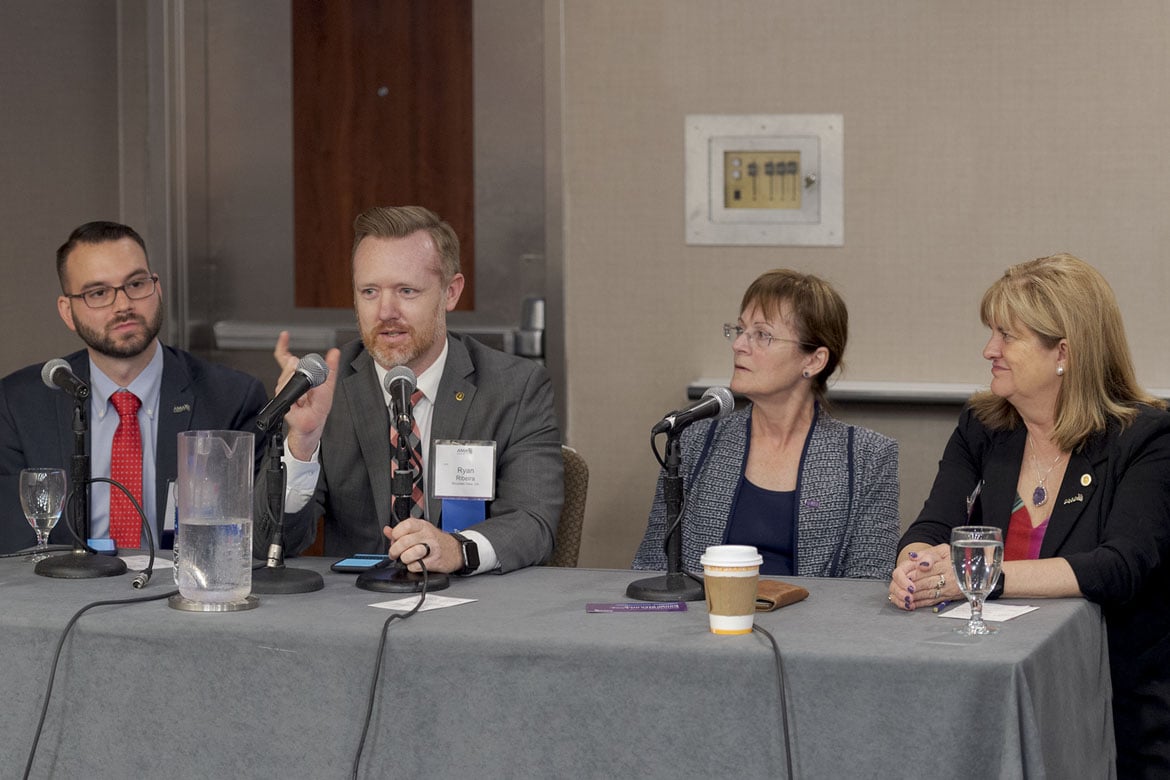The prevalence of burnout among physicians, residents and medical students is troubling. Beating burnout is not the type of thing that one can do alone, but there are interventions that you can implement by yourself and with the help of others to mitigate the possibility of experiencing burnout.
Committed to making physician burnout a thing of the past, the AMA has studied, and is currently addressing issues causing and fueling physician burnout—including time constraints, technology and regulations—to better understand and reduce the challenges physicians face. By focusing on factors causing burnout at the system-level, the AMA assesses an organization’s well-being and offers guidance and targeted solutions to support physician well-being and satisfaction.
Physician and resident panelists taking part in a recent discussion hosted by the AMA Medical Student Section offered a few interventions that could prove helpful in medical school and throughout your career. (Pictured above, left to right, they are: Drs. Hunter Pattison, Ryan Ribeira, Marie Brown and Jan Kief.)
Here are four tips offered by these expert panelists.
Get outside the red tape
Finding the joy in medicine is considered one of the elixirs to burnout. Throughout her career, Jan Kief, MD, has found that joy in the clinic she owned and operated as well as in her experiences working to educate the next generation of physicians.
“I always had in my office medical students; teaching keeps it so fresh,” said Dr. Kief, an internist from Highlands Ranch, Colorado, who is an adjunct faculty member at Rocky Vista University College of Osteopathic Medicine. “I’m always energized by students. That’s why I’m in academic medicine today.
Also, I did a couple of medical mission trips, and to be able to take care of people without the billing and administrative stuff and be with grateful patients—that really makes a difference.”
Work toward solutions
Telling others that you are experiencing burnout symptoms and then sending your concerns up the chain can have benefits, according to Hunter M. Pattison, MD, an emergency medicine resident at University of California, Davis Health in Sacramento.
“Burning out is a reaction to the system,” Dr. Pattison said. “When I started talking about my experiences and telling my story, I realized that there were other people that had similar experiences. We were able to identify different ways to try to help alleviate some of the restrictions that we had around holidays and things like that. It was a way to take charge and recognize what was causing the burnout and not just react to it.”
Dr. Pattison also advocated working for change at the macro level.
“I would also put in a plug for staying involved in organized medicine,” he said. “Coming to meetings like this and staying involved in your community and hospital organizations—that’s how you can make a difference and that’s why everyone on the panel is involved in this.”
Don’t overextend yourself
From medical school and onward in your career, seizing every opportunity that comes your way is simply not possible. Knowing what you do—and do not—have the bandwidth for can help you avoid burnout. That means, said Marie Brown, MD, knowing when to say no.
“The person who says yes to everything may seem the least likely to burnout can burn out,” said Dr. Brown, an associate professor of internal medicine at Rush Medical College and senior physician advisor for the AMA. “They are always happy, they are the go-to person” who can run a meeting, lead a project or make everyone else perform better. Yet, Dr. Brown said, appearances can sometimes be deceiving.
“If you are the yes person or you know somebody who is the yes person, you need to watch out for them,” said Dr. Brown at the session, which was held during the 2019 AMA Annual Meeting in Chicago.
Gratitude can go a long way
On the bad days, it pays more than ever to focus on the good.
“One of my dear friends is an astronaut. Astronauts adhere to this program of self-care, then team care, then mission,” Dr. Kief said. “So what does self-care mean? You can’t show up being a mess. Tell yourself three aspects of gratitude a day.”
Learn more with this curated collection of educational content on physician burnout. You can find that and more at the AMA Ed Hub™, an online platform that brings together all the high-quality CME, maintenance of certification, and educational content you need—in one place—with activities relevant to you, automated credit tracking and reporting for some states and specialty boards.




